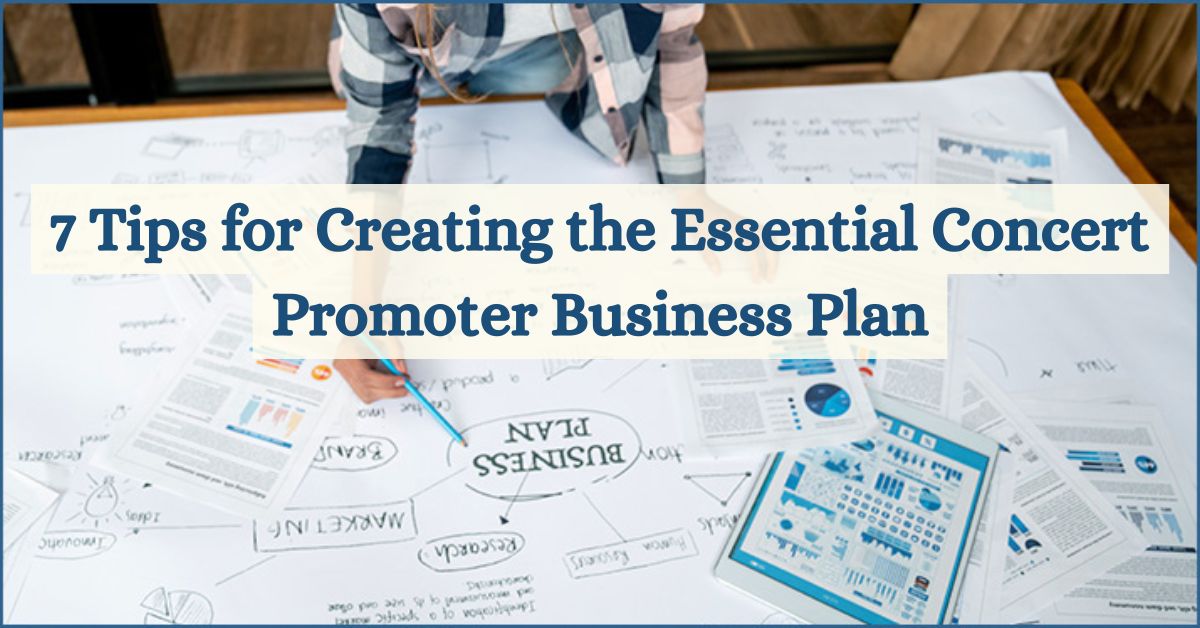Even though organizing a concert is crucial, many music event organizers still question the necessity of having a business plan. While it may be appealing to focus on reaching a specific goal at all costs, it is important to also have a well-thought-out plan that considers potential challenges and organizes all necessary steps.
Those who make business planning a priority can anticipate a ROI of as high as 6700%. This is because it will enhance clarity, establish structure, shape strategies & decisions, assist funding, and streamline every touchpoint.
However, you do not desire to develop any standard concert promoter business plan. You desire a robust, optimized, and backed platform that will enhance your concert-promoting potential. Continue reading to discover the essential tips every concert promoter must consider when developing the perfect business plan.
The importance of having a concert promoter business plan
Having a concert promoter business plan is crucial for a successful event as it addresses all aspects and guarantees a well-organized and accounted for event, allowing you to progress confidently and prevent any unexpected issues. It details the approaches, objectives, and steps a concert promoter plans to implement in order to advertise and organize live music events.
These factors are now crucial in the current market, as the Live Music sector is filled with numerous competitors. Indeed, the compound annual growth rate (CAGR) of live music stands at 3%, as competitors eagerly seize the chance to establish a presence in this steadily expanding sector.
A robust business strategy guarantees that your event will shine above the competition and receive the recognition it deserves in a saturated market.
7 Tips for Concert Promoter Business Plan
Here are seven suggestions for developing a business plan for a concert promoter that enhances experiences, connections, and overall achievement.
1 – Conduct market research and define your target audience
In order to successfully promote your upcoming event, it is crucial to conduct market research to collect additional information about your target audience. Market research involves more than just pinpointing your target demographic; it also entails grasping how to efficiently promote your event to them. This involves using specific marketing strategies to draw in attendees and ensuring they have an interactive experience at the event with access to entertainers, audience engagement activities, and additional offerings.
Through extensive research, you can discover important information about what your audience likes and wants, so you can adjust your marketing strategies and event planning to better suit their needs. It is essential to pay attention to your audience’s preferences and utilize the information collected to organize a memorable event that they will enjoy.
When conducting market research, keep in mind to:
- Discover how to communicate in their way – what specific words do they prefer? Do they lean more towards a professional or casual style? Professional advice: Understand the language used by your audience by analyzing them on social media, in interviews, during face-to-face interactions, and by studying key competitors in the industry.
- Contact them through their favored communication platforms. Expert advice: Begin by utilizing the data and analytics currently available to you in order to determine the platforms that align most effectively with your audience. From that point on, monitor and assess your actions in order to improve your channels, creative materials, written content, and posts.
- Comprehend what attracts them. Pro Tip: Establishing trust and loyalty among your audience can be achieved through this method. Music is individualized, and showing your audience that you understand them will result in a mutual effect, capturing their attention.
As you become more experienced in organizing concerts, you will constantly enhance your knowledge and understanding, ensuring your data is updated and improved for better targeting.
2 – Make your goals S.M.A.R.T.
The top business strategies will incorporate precise and quantifiable goals that are in line with broader objectives. The greater level of detail you include in your goals, the more prepared you and your team will be to reach them. An excellent illustration of the distinction between a vague objective and a SMART (Specific, Measurable, Attainable, Relevant, and Timely) goal is evident in the following scenario:
Vague Goal: ‘increasing attendee numbers’
SMART Goal: By August 30th, our event attendance will grow to 375 attendees (currently at 250) through three email reminders and paid social media ads.
Having clear and specific goals will enhance your ability and your team’s to succeed and monitor advancement towards your goals.
3 – Identify your distinct selling proposition
An essential aspect that every business should have is a distinctive selling point, as it assists in making you, your events, and your services noticeable. Think about the companies you collaborate with and how you can align yourself to help solve their problems with advocates.
If you are struggling to identify your uniqueness, think about beginning with:
- The kind of music performances that you specialize in.
- The audience you are most familiar with and connect with the strongest
- In the areas where you possess greater expertise
- Where your level of understanding is greater
- If you possess a competitive advantage within your organization
4 – Create your detailed budget
Your budget is one of the most crucial components of business planning. Having a thorough budget in place will help guarantee that your resources are used efficiently, allowing for long-term sustainability of your business and reducing the chances of overspending. Proper budgeting will enable you to realize your goals while staying within your financial limits.
You may also like:
↘️ Top 8 Personal Development Tips for Successful Business Owners
5 – Determine your financial projections
In order to obtain funding from investors or lenders, you must provide a convincing argument backed by your projections. Incorporate essential details like projected revenue and costs, a breakeven assessment, and a cash flow forecast to showcase the feasibility of your business strategy and the prospect of achieving success.
Financial projections provide valuable insights for monitoring your business’s performance, guiding immediate actions and informing future strategic choices.
6 – Outline your full & marketing operational plan for events
Developing a thorough plan that includes all required details is crucial for the success of an event. This involves developing a thorough plan of your activities, like ticket sales, logistics, and security. By doing so, you can detect potential problems ahead of time and make prompt modifications to stay on course.
Along with your operations plan, you must also create a strong marketing strategy that effectively advertises your event. There are numerous marketing strategies available, however, not all may align with your budget and objectives. Some effective methods for promoting events are creating event websites, sending announcements and reminders through email marketing, using QR codes, partnering with influencers, and utilizing social media platforms and tools.
Before your event, it is crucial to conduct thorough research to identify the most effective marketing strategies to use. Allocate time to examine the different possibilities like setting up event pages and listings on different free or paid platforms and hosting contests. By doing this, you can determine the best strategies for your budget and target audience, guaranteeing the success of your event.
In today’s digital world, it is essential to incorporate digital strategies into your concert promotions to stay relevant. Still, it is important not to overlook the effectiveness of offline tactics such as direct mail, face-to-face promotions, and billboards. Evaluate the costs, expected reach, and return on investment of both online and offline approaches to determine the most suitable for your target audience and company objectives.
Here are three strategies you should use to optimize the outcomes of your marketing plan:
- Conduct research and evaluate your marketing strategies and channels beforehand.
- Don’t separate offline and online strategies – they are more effective when combined. For example, a Q.R. code included in direct mail can drive traffic to your event website just like a social media post can. Surveys have shown that up to 32% of recipients scanned the Q.R. codes within the first week of receiving them!
- If you want to minimize spending, social media advertising can assist you in reaching your target audience more effectively, and organic TikTok posts are currently effective for raising awareness, especially if they feature the artists.
7 – Use technology to maximize your efficiency, organization and communication
Using a platform that allows you to organize your event from start to finish will greatly streamline your concert promoter business plan in a single location. Lack of integration between tools and systems, as well as using old spreadsheets, can restrict your ability to communicate and stay organized. On the other hand, the proper promoter platform efficiently organizes and monitors all aspects of your business to help you stay focused and ahead of the competition.
Conclusion
Ultimately, launching and managing a thriving concert promotion company necessitates a blend of careful strategizing, networking, strong marketing skills, and operational proficiency. By utilizing these seven tactics, you can enhance your likelihood of achieving success in the competitive music industry. Keep in mind that success depends on knowing your audience, creating memorable experiences, and being up-to-date on industry trends. Therefore, do not hesitate to transform your love for music into a successful concert promotion venture!

